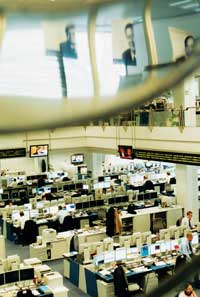Don’t let recession put off investment in the future

Investing in a recession can be tricky, particularly if you’ve seen existing savings slashed in a matter of months. But there are still opportunities.
Most of us have a bit of money stowed away – but where is the best place to invest it in the current economic climate? Interest rates are at rock bottom, equities are jittery and property markets have slumped. Where can you put your nest-egg away from risk?
But now could be the best time to reassess your plans for the future, says Roger Halle, director of the Country Land and Business Association’s Independent Financial Planners. “The best place to start is to look at where you are now, and where you want to get to – then you can prioritise your objectives and start to plan some actions.”
Successful investment can become the key to a viable retirement away from the farm, instead of having to struggle on indefinitely.
It’s true that for those willing to take more of a risk, the returns can be significantly higher. Even so, for all but the strongest risk-takers, investing is a long-term option.
Over the past 10 years the FTSE all-share index has increased by just 2% per year with income reinvested. Taken over 15 years, that would have produced a rise of 180%. But, of course, past performance is no guarantee of future growth. Successful investors need to make informed choices, or opt for a balanced fund to cover all the bases, including international and UK equities, cash, gilts, alternative investments, commodities and property, says Mr Halle.
“Commercial property is heavily out of favour, and losses have been massive. Is it now at rock bottom and could this be the time to invest? If you’re following everyone else you’re not going to make a huge amount of money – for big returns you need to look elsewhere.”
Rather than investing huge amounts of capital in bricks and mortar, farmers can use an investment trust, balanced in favour of commercial property – or they could buy shares in commercial property firms.
The same would be true of investing in commodities – it can either be done directly, or via ownership of shares in mining companies, for example.
Anyone choosing to invest in equities should seriously consider exposing themselves to the international market, rather than simply British shares, he adds. “My view is that we need to increasingly look abroad.”
Equities tend to rise based on economic growth, which is linked to population growth and productivity. “There are therefore massive opportunities in, say China and India, compared to the UK.”
Having decided on an investment type, farmers also need to consider their strategy. Most opt for “buy and hold” – a long-term, cheap and easy option. For those seeking more of a hands-on approach, without the extra hassle, a managed fund could be the way to go, allowing a professional to make informed changes to your portfolio as required, while staying within defined market sectors.
Timing the market – choosing to buy and sell in reaction to market rises or falls – can be a risky venture, but also holds greater potential for capital growth. “Choose your fund managers carefully – there are a few who do a fantastic job – the rest don’t.”
Unconstrained funds don’t limit investors to one particular sector, allowing complete freedom for fund managers – or the farmer himself – to move between sectors to capitalise on market movements.
“Ultimately, you need to understand what you are trying to do – what are you saving for? Know the pitfalls and the opportunities, and invest accordingly.”
